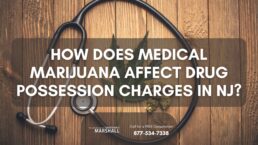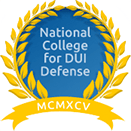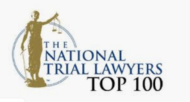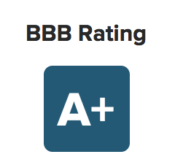
Some people may be confused about medical marijuana possession laws in New Jersey and how medical marijuana affects drug possession charges in New Jersey. It is important to know that New Jersey has not legalized recreational marijuana, and you can still be jailed and fined for criminal marijuana possession.
To access legal medicinal marijuana in New Jersey, you must register as a patient under the care of a licensed healthcare practitioner and obtain a specified amount from a state-licensed Alternative Treatment Center or dispensary. If you have not met these requirements and are in possession of marijuana, you risk arrest on marijuana charges.
A marijuana charge conviction may still be a problem when you apply for a job, school loans, scholarships, or public assistance. If an experienced drug defense attorney from the Law Offices of Jonathan F. Marshall in New Jersey represents you, then you have a better chance of avoiding harsh penalties such as jail time. Contact the Law Offices of Jonathan F. Marshall for a free consultation about the legal issues you are facing.
Understanding New Jersey’s Medical Marijuana Program
To become a registered patient with the New Jersey Medicinal Cannabis Program, you must:
- Be a New Jersey resident.
- Have a bona fide relationship with a healthcare provider registered with the program. This means:
- A practitioner-patient relationship has existed for at least one year, or
- The provider has assessed you for a debilitating medical condition on at least four visits or
- The provider has conducted a comprehensive medical history and physical exam and assumes responsibility for the care of your qualifying medical condition.
- Be diagnosed with a qualifying medical condition, including:
- Amyotrophic lateral sclerosis
- Anxiety
- Cancer
- Chronic pain
- Dysmenorrhea
- Glaucoma
- Inflammatory bowel disease, including Crohn’s disease
- Intractable skeletal and muscular spasticity
- Migraine headaches
- Multiple sclerosis
- Muscular dystrophy
- Opioid Use Disorder
- Positive status for Human Immunodeficiency Virus (HIV) and Acquired Immune Deficiency Syndrome (AIDS)
- Post-Traumatic Stress Disorder (PTSD)
- Seizure disorder, including epilepsy
- Terminal illness with a prognosis of less than 12 months to live
- Tourette Syndrome
Once you have an Authorizing Provider Statement from your healthcare provider, you will have a reference ID number and a registry ID number to set up an account. You will need to create a username and password to set up an account in the Medicinal Cannabis Program patient portal. Then, complete the registration process by:
- Identifying an Alternative Treatment Center where you will buy medicinal cannabis.
- Uploading proof of your New Jersey residency.
- Selecting your ID card option. Digital ID cards are free. Physical cards cost $10. Either are valid for two years.
- Uploading a recent full-face, front-facing photograph.
As a registered patient, you will be authorized to obtain a valid prescription of cannabis from your healthcare provider of up to 84 grams (2.96 ounces) for every 30-day period.
Medical Marijuana vs. Illegal Possession: Key Distinctions
If you register with the NJ Medicinal Cannabis Program (MCP), you will be expected to comply with medical marijuana possession laws in New Jersey and MCP regulations, including:
- Proof of Cardholder Status: Patients and their caregivers should carry proper identification, including MCP cards, at all times.
- Allowable Limits and Public Consumption: Possession that exceeds the legal limit, even with a card, may result in marijuana charges. Patients are encouraged to use medicinal cannabis only at home and keep it at home once it is there.
- Driving Under the Influence: Do not operate an automobile or other vehicle while under the influence of medicinal cannabis. You may be arrested for driving under the influence of drugs (DUID), regardless of your registration for medical marijuana.
- Federal Law Considerations: The MCP is a state program authorized by New Jersey state law. Despite ongoing legal reform in New Jersey and other states, marijuana is a Schedule I controlled substance under the federal Controlled Substances Act. You risk federal charges if you smoke on federal lands or in federal buildings within New Jersey. You risk charges if you transport medicinal cannabis across state lines.
Potential Defenses Against Drug Possession Charges with a Medical Marijuana Card
If you are registered with the MCP and are detained by police and questioned about marijuana possession, you will be better off if you can present your registration card, and the amount of marijuana you have is within the program’s limit.
Regardless of the amount you have, you should state that you possess “medicinal marijuana for personal use.” This is to indicate your lack of intention to distribute, which is an additional charge often added to charges of possession.
Sale or distribution of less than 1 ounce of marijuana — even just a loose joint or blunt — is a fourth-degree offense under New Jersey law punishable by up to 18 months in prison and a fine of up to $25,000.
If you are arrested, you should decline to answer questions and ask to contact a drug defense lawyer in New Jersey. At your first opportunity, you should contact the Law Offices of Jonathan F. Marshall. We have nine offices in New Jersey. Our drug crime attorneys have tried cases in courtrooms throughout the state. The professional working relationships we have established with prosecutors can help us get a fair hearing for our clients.
We will respond as quickly as possible. In some cases, a skilled defense attorney may be able to have charges dismissed on procedural violations, such as:
- Lack of probable cause for stopping and searching you or your vehicle
- Illegal search and seizure
- Improper arrest, including failure to advise of your Miranda rights against self-incrimination
- Racial, ethnic, socio-economic, gender, or other bias in your arrest.
The Importance of A Criminal Defense Attorney in New Jersey
If you are convicted of possession of marijuana in New Jersey, you can go to jail, be fined, and suffer additional penalties. Possession of 50 grams (1.76 ounces) or less of marijuana is a disorderly person’s offense punishable by up to 6 months in jail and a fine of up to $1,000. Possession of more than 50 grams of marijuana is a fourth-degree offense, punishable by up to 18 months in prison and a fine of up to $25,000.
New Jersey courts can also suspend the driver’s license of a person convicted of marijuana possession for 6 months to 2 years.
However, an arrest is not a verdict of guilt. The New Jersey criminal process has several steps. With an experienced drug defense lawyer from the Law Offices of Jonathan F. Marshall representing you, there are multiple opportunities to avoid penalties or even a guilty verdict in a marijuana charge case.
If we cannot have the marijuana charges dismissed, you may be eligible for Conditional Discharge probation if you have no previous drug conviction and no prior referral to a diversion program. There are also rehabilitation-centered probation programs available for nonviolent first-time offenders if you have a drug problem you are ready to deal with. New Jersey also offers a Veterans’ Diversion Program for active and retired members of the military accused of nonviolent crimes who have been diagnosed with mental illness or who have exhibited symptoms of mental illness.
With proper representation, there are opportunities to avoid having a marijuana possession conviction on your permanent record.
Contact a Drug Defense Attorney in New Jersey Today

Marijuana laws are changing, but possession of marijuana remains illegal in New Jersey unless you are enrolled in the N.J. Medicinal Cannabis Program and comply with New Jersey laws. If you face marijuana possession charges in New Jersey, contact our experienced drug crime defense lawyers at any of our New Jersey office locations as soon as possible to discuss your legal options. Your initial legal consultation with the Law Offices of Jonathan F. Marshall is always free.











